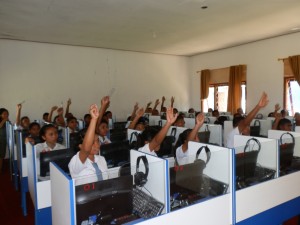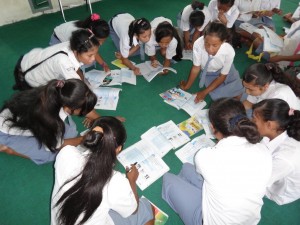 For a relatively small island in the middle of the Indian Ocean Tourism is hugely important. Tourism automaticaly demands for a good command of the English language. Students in Indonesia start learning English in primary school, but are often too timid and too shy to use it effectively. This is inherent to the Indonesian culture.
For a relatively small island in the middle of the Indian Ocean Tourism is hugely important. Tourism automaticaly demands for a good command of the English language. Students in Indonesia start learning English in primary school, but are often too timid and too shy to use it effectively. This is inherent to the Indonesian culture.
Improving communication skills in the English language requires that high-quality learning materials are present, and teachers have the necessary practical skills to encourage students to communicate in English.
Hand-copy of books leads to reduced attention
 A major shortcoming for students is lack of a personal English lesson materials. Some students whose parents can afford it, may make copies. But often enough, a student has to do without books. As result they hand-copy large parts of the lesson material. This pupils are no longer with their full attention at the teacher. What comes to the expense of attention to communication skills, additional explanations or their tasks for homework.
A major shortcoming for students is lack of a personal English lesson materials. Some students whose parents can afford it, may make copies. But often enough, a student has to do without books. As result they hand-copy large parts of the lesson material. This pupils are no longer with their full attention at the teacher. What comes to the expense of attention to communication skills, additional explanations or their tasks for homework.
The solution is a personal English textbook for each student. So students do not have to hand-copy lessons and more time is left for communication.
A boost in self-confidence
To give a student enough confidence and motivation to converse in English it is necessary that the quality and skills of both teachers and students improves. The classes are being taught by teachers who have insufficient knowledge of the English language. Also barely any attention is paid to speaking and listening skills in class.
Extra classes for pupiland teacher
It is therefore essential that students get extra English lessons. All pupils have two classes instead of one class per day. The current two English teachers remain responsible for teaching, but are guided by David Rothe, an English teacher from Switzerland. He accompanies them until they themselves can teach independently.


One Comment